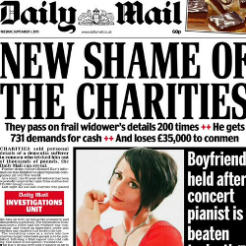The Fundraising Standards Board and information regulator have both said that they will investigate "concerning" allegations in today's Daily Mail about charities selling a dementia sufferer's contact details to catalogue scammers.
The Mail claimed that 87-year-old Samuel Rae had been tricked into giving away £35,000 to “unscrupulous catalogue scammers” who obtained Mr Rae’s details from various charities including the PDSA, Diabetes Research and Welfare Foundation and Cancer Recovery, amongst others.
Mail reporters made "subject access requests” to a number of the organisations – as well as telemarketing firms such as the Prize Winners Club, Biotonic and Best Of – to “demand a copy of the information an organisation holds”. The requests were made on behalf of Samuel Rae by his son, Chris.
The Fundraising Standards Board has said the tabloid’s allegations are “deeply concerning” and has vowed to further investigate charity data-sharing practices.
Alistair McLean, chief executive of the FRSB said: “It is deeply concerning that anyone, not least someone who may be vulnerable, is said to have had their contact details exploited in this way. We intend to fully investigate these allegations.
“It is critical that the public clearly understands how their contact details may be used, and that data-sharing practices within the sector are thoroughly reviewed.”
McLean also said that, due to recommendations made by the FRSB in its interim-report into charity fundraising practices in June, the IoF has task groups “currently reviewing these issues, ahead of making necessary changes to the Code of Fundraising Practice" .
Peter Lewis, chief executive of the Institute of Fundraising, said: “Our Standards Committee is looking closely at how charities should treat the data of individuals fairly, including the practice of buying, selling, and sharing data, as part of our review of the Code and further announcements on this will be made soon.”
Steve Eckersley, head of enforcement at the Information Commissioner's Office, said: “We have been presented with some clearly concerning findings about data sharing and sale in the charity sector, and we will be investigating them further.
"The law applies to charities as it does to any other company. We already have an ongoing investigation into marketing practices in the charity sector, and where we find companies have broken the law we will take action.”
PDSA 'saddened and disappointed' by allegations
The People’s Dispensary for Sick Animals (PDSA) has said it is “saddened and disappointed” to find out from the Mail that Samuel Rae, “one of our supporters has been the victim of fraudulent behaviour”.
In a statement given to Civil Society News the PDSA said that Rae has been a supporter of the charity since 1994 and in 2004 had “asked us not to share his details with outside organisations, and we complied immediately with his wishes. Over two years ago, we proactively decided to stop trading or swapping supporters’ personal details”.
The organisation also said that: “Any data sharing in which PDSA engaged in the past was done in good faith, working with recognised agencies,” and will “fully co-operate with the Information Commissioner’s Office should an investigation follow”.
Civil Society News contacted a number of the other charities featured above but, at the time of publishing, have yet to receive comments.
Daily Mail figures are ‘misleading’ says expert
A charity data expert has said that the figures in today’s Daily Mail exposé into charity data sharing are “misleading” as charities don’t “sell” lists containing donor’s information to one another.
The specialist, who wished not to be named, told Civil Society News that instead of "selling" information lists on to one another; charities will lend lists to other organisations, 99 per cent of which is for “one-time usage”.
Occasionally, a person's contact details might be "leased" for a year, but this only happens with lifestyle derived data and will almost always involve the person ticking something saying they would give to a named charity.
“It means that if one organisation benefits from contacting someone, they can then lend it to other charities in the hope that they can benefit from it too,” she said. “Anyone (in the wider telemarketing sector) can get access to the information once. When they swap again it will be for a one time usage.
“Under the rules of the Mail Preference Service, every time a supporter signs up they will be offered the chance to opt out. The MPS has been around for over 20 years and is the best way for people to keep their data clean.”









